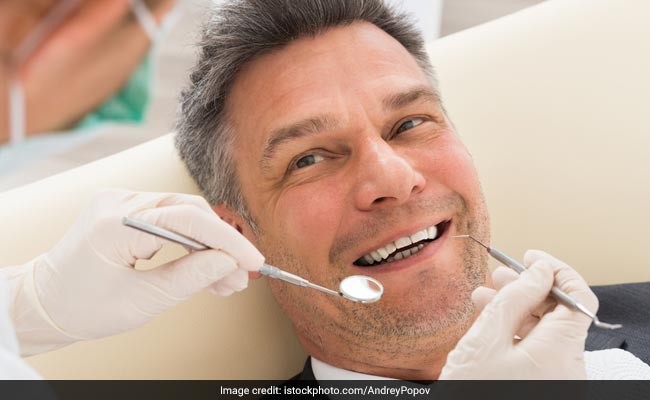A new study says that people who drink more than daily recommended limit of alcohol may get an unhealthy mix of bad bacteria in their mouths.

Heavy drinkers can have more bad bacteria in mouth: study
HIGHLIGHTS
- Studies have found a link between guts microbiome and its risk factors
- Alcohol can be harmful for your oral hygiene
- Maintaining oral hygiene is important for our overall well-being
There simply cannot be enough harms of drinking too much alcohol. From weight gain to disturbed sleep, alcohol abuse can be dangerous for your body and health in many ways. Now, a new study says that people who drink more than daily recommended limit of alcohol may get an unhealthy mix of bad bacteria in their mouths. The study, which was published in online journal Microbiome on April 23, is the latest research with regards to factors that influence human microbiome, which are thousands of bacteria that occur naturally in the body.

Alcohol can increase bad bacteria in your mouth: study
Photo Credit: iStock
As part of the study, researchers found that people who drink heavily had lesser amount of good bacteria in their mouth, as compared to moderate or non-drinkers. In addition to this, heavy drinkers were also found to host more bad bacteria in their mouths, including bugs that are capable of causing heart disease, gum disease and cancer.
Heavy drinking is referred to drinking more than the recommended intake of alcohol by US health officials, which is 1 drink a day for women and 2 drinks a day for men.
Also read: 5 Things You Should Avoid Doing When Having Alcohol
In the past too, studies have found a link between gut's microbiome and the risk factors that it can cause. Researchers have found that good diversity in gut microbiome is directly proportional to good health.
Any imbalance in the gut's microbiome can increase risk of cavities and gum diseases.
The study was done in order to find out which lifestyle habits influence oral microbiome, and drinking habits were found to be a natural factor to be considered. This is because there has been evidence which says that alcohol can affect bacterial makeup of the mouth.
As part of the study, mouthwash samples were taken from 1,044 US adults who were participating in ongoing natural cancer studies. Around 25% people said that they were non-drinkers, while 59% said that they were moderate drinkers and 15% were heavy drinkers.
People who were regular drinkers, especially the heavy drinkers have lesser good bacteria - lactobacillales - which is commonly used in probiotic supplements as well. These drinkers were found to have higher levels of bad bacteria.
In the meantime, experts also feel that it is not clear what to substantiate for the findings, since there are various factors which impact oral microbiome. These factors include diet, brushing teeth, dental care, income and demographics. Moreover, it is unclear as to how many of the people categorised as heavy drinkers are dependent on alcohol. People who are dependent on alcohol are different from moderate drinkers and non-drinkers.
Also read: Here's How Consuming Alcohol Can Affect Your Sex Life
Researchers mentioned that they took various factors into consideration like people's age, smoking habits, their race, level of education and body weight. However, they stated that they did not consider the difference between heavy drinkers and people dependent on alcohol.

Maintaining oral hygiene is important for your overall health
Photo Credit: iStock
Hence, more comprehensive and detailed research is still required on the topic. Considerations such as can alcohol partially cause increase in some bad bugs and reduce some good ones; does heavy drinking promote certain diseases because of changing the bacterial makeup of oral cavity, etc.
Nonetheless, both limiting alcohol consumption and maintaining oral hygiene are important for good overall health and well-being.
Some risk factors caused by excessive consumption alcohol are as follows:
1. Alcohol can cause weight gain.
2. It can cause depression and negatively impact mental status.
3. It can cause high blood pressure, which increase risks of heart disease and stroke.
4. It can cause bleeding and cancer in the gastrointestinal tract.
5. Excessive alcohol consumption can cause inflammation in the pancreas.
6. It can cause damage to brain cells and dementia.
7. Alcohol negatively impacts the body's nervous system.
Also read: Nonalcoholic Fatty Liver Disease (NAFLD): Top 5 Causes You Must Know
Following are the most effective ways to maintain oral hygiene:
1. It is important to brush your teeth twice daily. Brushing is done effectively when you choose the right toothbrush with soft bristles, toothpaste with fluoride and use the right amount of toothpaste.
2. Tongue cleaning and flossing are important aspects of maintaining proper oral hygiene.
3. Avoid alcohol-based mouthwashes and switch to their therapeutic counterparts.
4. Eat calcium-rich foods like leafy green vegetables, almonds and celery for white, sparkling teeth.
5. Avoid sugary foods as they are bad for your dental health.
6. Incorporate the habit of rinsing your mouth every time you eat.
Disclaimer: This content including advice provides generic information only. It is in no way a substitute for qualified medical opinion. Always consult a specialist or your own doctor for more information. NDTV does not claim responsibility for this information.
DoctorNDTV is the one stop site for all your health needs providing the most credible health information, health news and tips with expert advice on healthy living, diet plans, informative videos etc. You can get the most relevant and accurate info you need about health problems like diabetes, cancer, pregnancy, HIV and AIDS, weight loss and many other lifestyle diseases. We have a panel of over 350 experts who help us develop content by giving their valuable inputs and bringing to us the latest in the world of healthcare.














